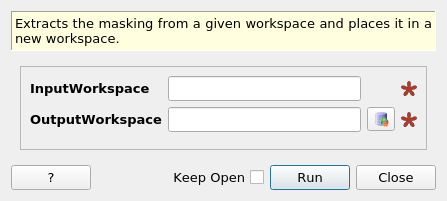\(\renewcommand\AA{\unicode{x212B}}\)
ExtractMask v1¶

ExtractMask dialog.¶
Summary¶
Extracts the masking from a given workspace and places it in a new workspace.
See Also¶
Properties¶
Name |
Direction |
Type |
Default |
Description |
|---|---|---|---|---|
InputWorkspace |
Input |
Mandatory |
A workspace whose masking is to be extracted |
|
OutputWorkspace |
Output |
Mandatory |
A workspace containing the masked spectra as zeroes and ones. |
|
DetectorList |
Output |
int list |
A comma separated list or array containing a list of masked detector ID’s |
Description¶
The masking from the InputWorkspace property is extracted by creating a new MatrixWorkspace with a single X bin where:
0 = masked;
1 = unmasked.
The spectra containing 0 are also marked as masked and the instrument link is preserved so that the instrument view functions correctly.
A list of masked detector IDs is also output. Note this contains the detector IDs which are masked rather than the index or spectrum number.
Usage¶
Example
#create a workspace with a 3*3 pixel detector
bankPixelWidth = 3
ws = CreateSampleWorkspace(NumBanks=1,BankPixelWidth=bankPixelWidth)
#Mask out every other detector
MaskDetectors(ws,WorkspaceIndexList=range(0,bankPixelWidth*bankPixelWidth,2))
wsMask, maskList = ExtractMask(ws)
#This mask can then be applied to another workspace
ws2 = CreateSampleWorkspace(NumBanks=1,BankPixelWidth=bankPixelWidth)
MaskDetectors(ws2,MaskedWorkspace="wsMask")
print("Masked Detectors")
print("n ws ws2")
for i in range (ws.getNumberHistograms()):
print("%i %-5s %s" % (i, ws.getDetector(i).isMasked(), ws2.getDetector(i).isMasked()))
print("\nMasked detector IDs")
print(maskList)
Output:
Masked Detectors
n ws ws2
0 True True
1 False False
2 True True
3 False False
4 True True
5 False False
6 True True
7 False False
8 True True
Masked detector IDs
[ 9 11 13 15 17]
Categories: AlgorithmIndex | Transforms\Masking
Source¶
C++ header: ExtractMask.h
C++ source: ExtractMask.cpp
